Negotiating Better Working Conditions as a Night Shift Employee
Night shift employees often face unique challenges – from irregular sleep and health issues to feeling left out of workplace decisions. The good news is you can advocate for better working conditions. This post will walk you through practical, conversational strategies to negotiate improvements in your schedule, health support, pay, safety, and career growth.
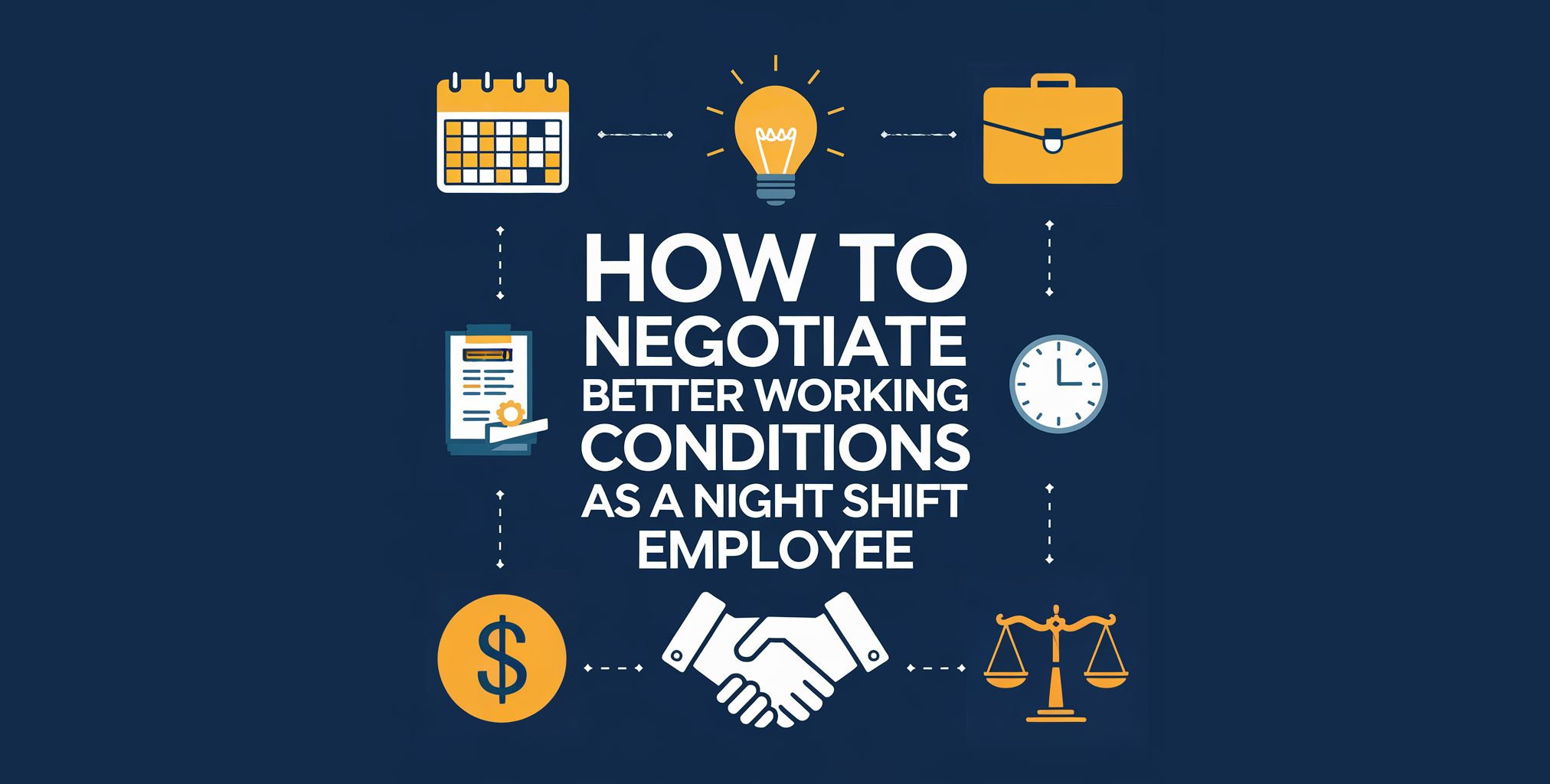
Understand Your Needs and Do Your Homework
Before marching into your manager’s office, take some time to gather data and clarify what night shift working conditions you would like to improve. Night shift workers deal with issues like fatigue, family disruptions, and fewer resources on the job – but which matter most to you?
Identify Pain Points:
- Maybe you’re struggling with an erratic rotating schedule that wrecks your sleep, or you’ve noticed the company doesn’t offer a night shift pay differential. Jot down the specific conditions you want to improve.
Track Examples and Data:
- Keep a simple log if relevant – for instance, note days you only got 4 hours of sleep due to a quick turnaround between shifts, or examples of safety risks you’ve seen at night. Concrete examples strengthen your case.
- You can also research industry norms or studies. (For example, studies show accident rates are about 30% higher on night shifts than day shifts, highlighting why fatigue is a real safety concern.)
Know Company Policy and Rights:
- Review your employee handbook or union contract if you have one. Are there existing policies on shift differentials, overtime, or wellness? Knowing what’s already in place will help you target your requests.
- Also, be aware of basic labor rights – e.g. in the U.S., no law requires extra pay for night work, it’s left to employer agreements (dol.gov). This means such benefits exist only if you negotiate them (individually or through a union).
By doing this homework, you’ll be prepared to build a solid case when you start the conversation. Now let’s dive into common areas night shift workers can negotiate.
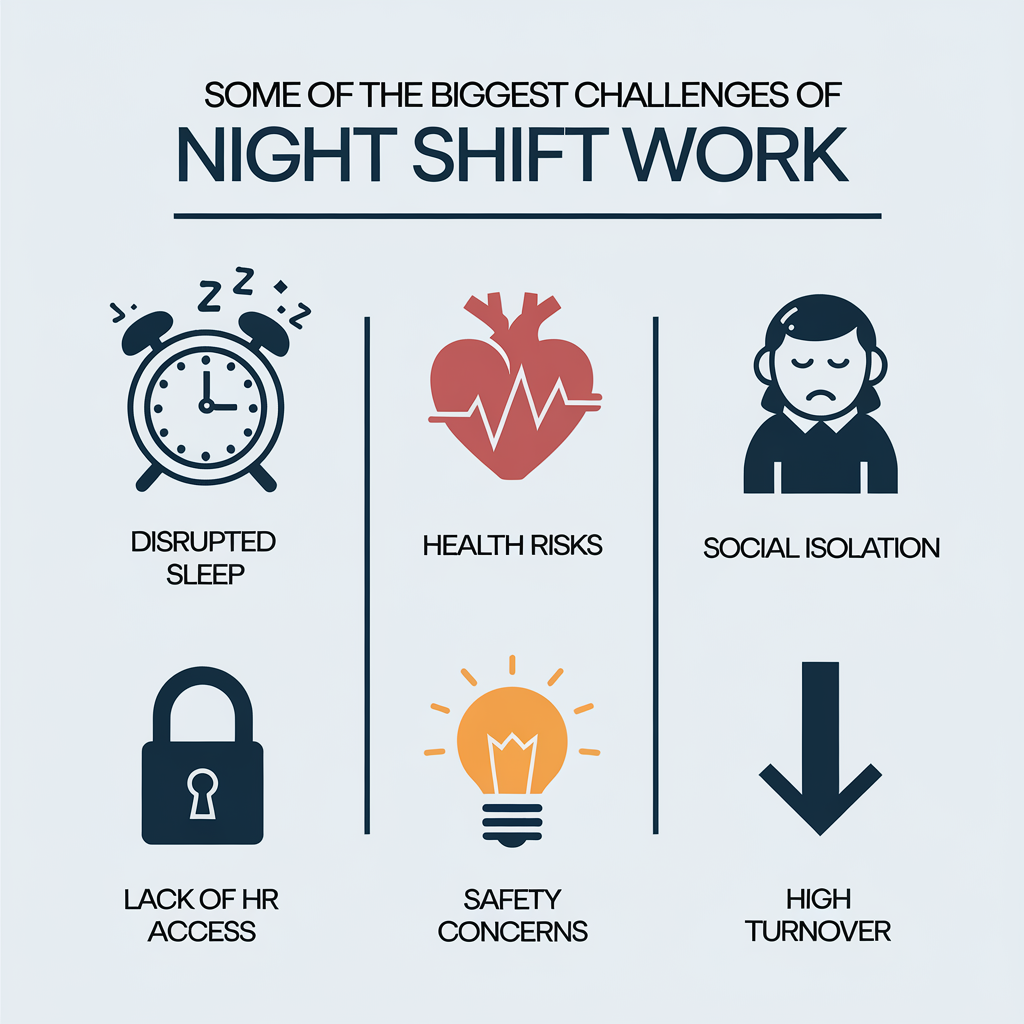
1. Scheduling Flexibility: Find a Routine That Works
One of the biggest struggles of night work is dealing with the schedule. If you have little control over when you work, it can wreak havoc on your sleep and personal life. Negotiating for more flexible or predictable scheduling is a top priority for many night shifters.
Explain Why It Matters:
Help your employer understand that a better schedule isn’t just a personal whim – it can improve your performance and support overall night shift working conditions. Irregular, ever-changing shifts make it hard to adapt. In fact, research shows workers are more at risk of injuries when they frequently switch between different shift times (ccohs.ca). Consistency and adequate rest benefit the company by keeping you safer and more alert. Experts even recommend keeping schedules regular, predictable, and set in consultation with employees (ccohs.ca) – in other words, involving you in the scheduling process leads to better night shift working conditions for everyone.
What to Ask For:
Think about what scheduling change would help you most. Some ideas to negotiate:
More input into your schedule or rotations:
- Request a say in the shift roster. This might mean asking for a set rotation you prefer (e.g. a steady night schedule instead of oscillating between nights and days), or at least the ability to swap shifts occasionally.
- If you have a personal obligation (like classes or childcare) on certain days, propose a consistent pattern that accommodates it.
Clustered or adjusted shifts:
- If you’re working five nights in a row, you might ask to reduce consecutive night shifts or to get two days off in a row to recover. (There’s evidence that limiting the number of nights worked in a row and ensuring consecutive days off helps manage fatigue).
Forward-rotating schedules:
- If rotations are necessary, suggest a forward rotation (e.g. morning → evening → night) rather than backward. Forward rotations are easier on the body’s clock. You could bring this up as a solution backed by health science.
Shift swapping or job-sharing:
- If flexibility is tough in your role, see if you can team up with a coworker to occasionally trade shifts or split a shift. Perhaps you and a colleague can rotate preferred days off. Coming to your boss with a mutually agreed swap arrangement shows initiative and makes approval easier.
- For example, you might propose that you and a teammate rotate the toughest Friday night shift every other week, so each of you gets a break on alternating weeks (a win-win that keeps coverage intact).
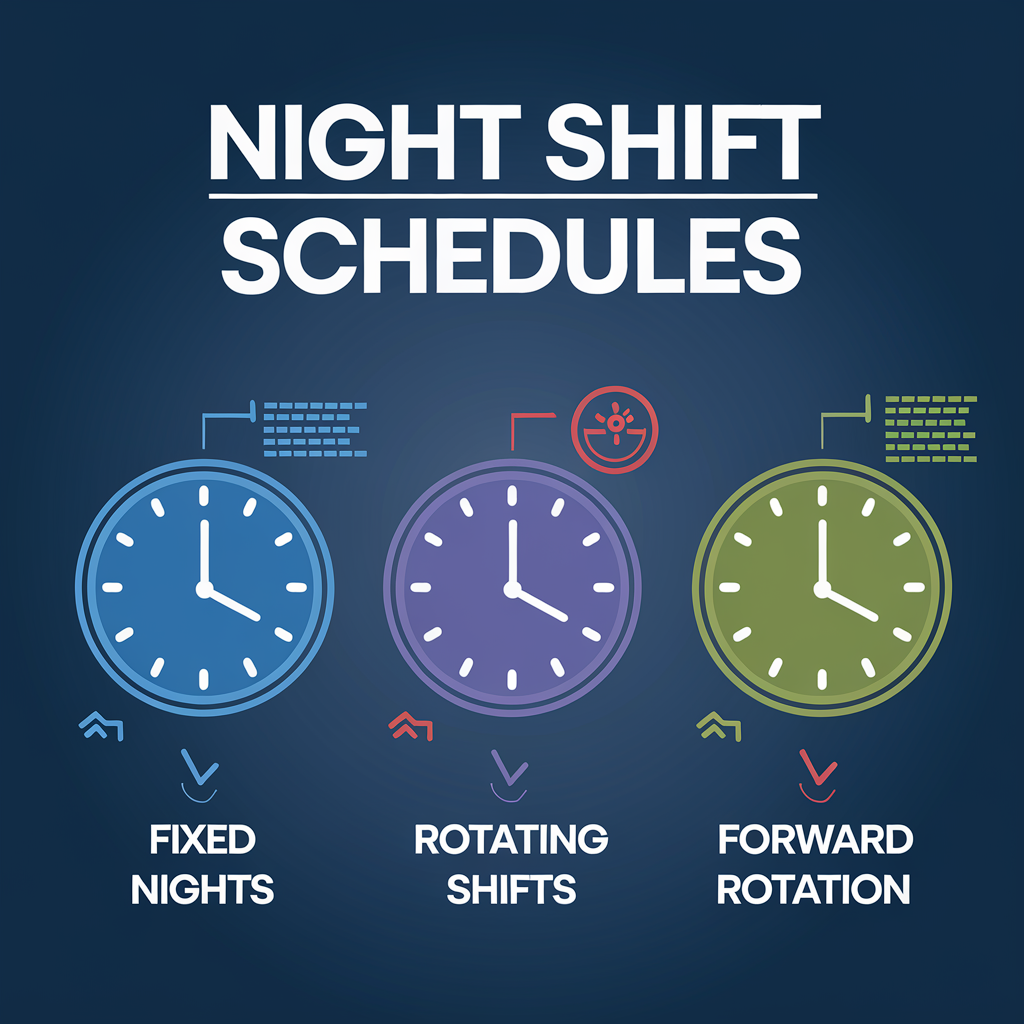
How to Approach It:
When you’re ready, schedule a meeting with your supervisor or scheduler to discuss this (don’t just catch them in passing). Present your request as a benefit to both better night shift working conditions and the workplace.
You might say, for instance: “I’ve noticed I’m much more productive when I can stick to a consistent night schedule. I’d like to discuss possibly fixing my shift times instead of rotating. I believe this will reduce errors from fatigue and improve my overall reliability for the team.” Back it up with one or two key points from your log or research (e.g. mention that stable schedules are recommended by safety experts (ccohs.ca)).
Be open to compromise. Maybe your boss can’t grant every night off you want, but you might gain a partial concession like a set pattern or at least input on the schedule each month. Even a small increase in control over your schedule can make a big difference in your work-life balance.
2. Health and Wellness: Advocate for Your Well-Being
Night shift work is tough on the body and mind – no two ways about it. Disrupted circadian rhythms and chronic fatigue can lead to real health issues over time, from sleep disorders to increased risk of heart disease. That’s why it’s completely legitimate to ask your employer for support in managing these challenges. A responsible employer should want healthy, alert workers. Here’s how you can open that dialogue:
Highlight the Challenges:
Share a bit about the health impacts you and your coworkers experience. You don’t need to get too personal, but it’s okay to mention, for example, “Working nights has made it hard for me to get quality sleep. I know this schedule can increase fatigue and stress levels.”
The goal is to make HR or your manager aware that wellness isn’t a trivial concern. You might even cite that night shift workers are at higher risk of issues like fatigue-related accidents or even long-term health conditions (ccohs.ca), so you’re asking for proactive solutions.
Ask for Wellness Resources:
Brainstorm a few practical wellness supports that would genuinely help you and propose them. Some ideas:
Better break accommodations:
- Night shifts can be eerily quiet, but that doesn’t always mean restful. Ask if it’s possible to get an extra short break during a long night shift to recharge, especially during the lull around 3-4 AM when energy dips.
- Some progressive workplaces even allow brief power naps on night shifts to combat drowsiness. If a nap room or nap policy is a possibility, it could be something that really helps. At minimum, ensure you’re getting your legally required breaks, and don’t hesitate to use them for a quick rest or healthy snack.
Sleep and fatigue management training:
- Suggest that the company provide training or resources on coping with shift work. This could be a wellness workshop on sleep hygiene for shift workers, or informational materials from organizations like NIOSH (National Institute for Occupational Safety and Health). It shows you want to improve and stay healthy on the job.
- If you have an Employee Assistance Program (EAP), ask HR if they have resources for sleep or stress management as part of it.
Health screenings or wellness perks:
- Night workers sometimes miss out on the health perks that day staff get (like on-site health fairs or fitness classes at 5 PM). Ask if similar offerings can be made accessible to you. For instance, could the company sponsor annual health check-ups for night shift staff or provide subsidized gym memberships for those who work odd hours?
- Even small things like having healthy snacks available during the night (instead of just a sad vending machine items) show support. There’s no harm in pointing to examples like that and saying, “These kinds of programs would help me stay healthy and energized, which is good for the company too.”

Fatigue management tools:
- If your work is prone to fatigue-related errors (say, operating machinery or driving vehicles at night), you could bring up tools or policy changes to mitigate risk.
- This might include asking for optimal lighting improvements in your workspace to help you stay alert (proper bright lighting can reduce circadian disruption), or suggesting a buddy system for hazardous tasks so that no one is working on risky stuff completely alone while tired. More on this later in the section “4. Workplace Safety: Fight Fatigue and Stay Secure”.
When discussing health-related accommodations, frame them as a way to boost productivity and safety.
For example: “I think if we had a short 15-minute rest break in the early morning hours, it could help us stay more alert till the end of the shift. Studies show accidents go up when workers are exhausted, so this could actually protect the team and the company”
By connecting the dots between your well-being and the company’s interests (fewer accidents, higher productivity), you make a compelling case for better night shift working conditions.
3. Pay Differentials and Fair Compensation: Know Your Worth
Let’s talk money. Night shift premiums (extra pay for working undesirable hours) are a common way employers recognize the inconvenience of working at night. But not every company offers them, and the amounts vary widely.
As a night shift employee, you should ensure you’re being compensated fairly for the sacrifices you make. If you discover you’re not, this is a totally reasonable thing to negotiate.
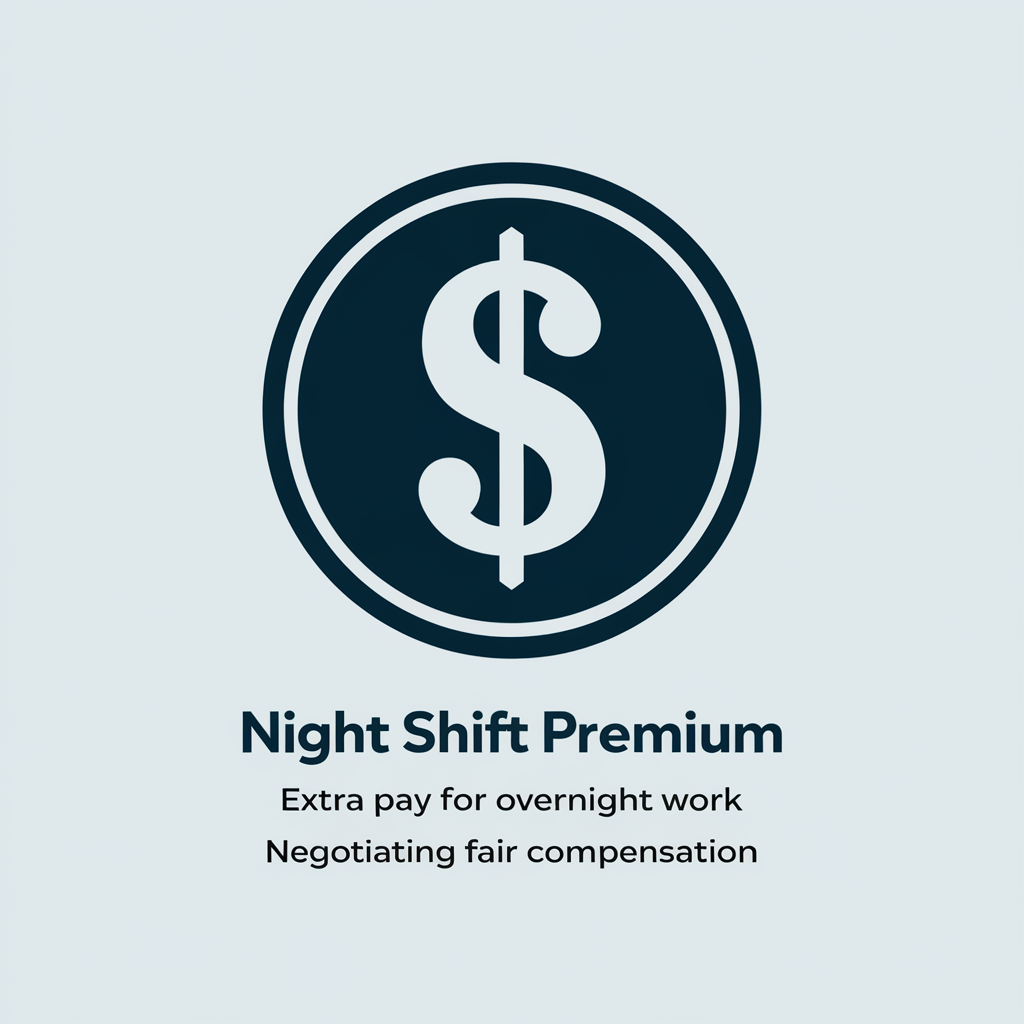
Do Some Salary Sleuthing:
First, find out what the norm is for your industry or region. For instance, federal government employees usually get a 10% night pay differential for regular night work, and many private companies offer somewhere between 5% to 20% extra per hour for night shifts (indeed.com).
If you have contacts in similar jobs or can find info online (sometimes job postings or forums might mention “night shift premium”), use that as intel. Also check your company’s policy – it might be hidden in the employee manual or an offer letter. If you’re already getting a small shift differential but feel it’s not adequate, note what competitors are paying to use as leverage.
Know the Law (or Lack Thereof):
As mentioned earlier, in many places there’s no legal requirement for extra night pay (dol.gov). Overtime (over 40 hours a week) must be paid, but simply working at night doesn’t automatically earn you more by law.
This means any night premium is at the employer’s discretion or a result of collective bargaining. Translation: you may have to ask for it; it won’t fall into your lap.
Use this fact to emphasize that you are bringing it up because it’s important – otherwise it might be overlooked.
Make the Case for a Night Differential:
If your company currently doesn’t pay extra for night work (or if the premium hasn’t increased in ages), prepare to present why it should. Some talking points:
Unpleasant Hours:
- Remind them (diplomatically) that working overnight is a significant lifestyle burden that not everyone can handle. It’s fair to be compensated for that inconvenience, as an incentive to retain experienced staff on nights.
- Many companies use shift premiums “to attract potential employees to jobs with nontraditional work schedules” (indeed.com).
Higher Costs of Night Work:
- Explain any extra costs you personally incur by working at night. Do you have to arrange special late-night transport or child care because of your schedule? Do you end up spending more on meals or coffee to stay awake? These personal anecdotes can underline that night workers often spend more out-of-pocket to keep things going.
Retention and Morale:
- If you know coworkers who left because of the hardships of night shift (or if turnover is high on nights), point out that a better differential could improve morale and keep people on the job. Training new staff constantly is costly; paying current employees a bit more might actually save money long-term.
Equity and Overtime:
- Ensure that your overtime is fairly calculated too. Shift differential, if you have one, should typically be included when calculating overtime rate (so you get time-and-a-half on your base plus differential). If you suspect that isn’t happening, that’s something to raise or even legally verify.
- It might not be intentional – sometimes payroll systems mess up when handling odd hours – but you should get it corrected. If you’re hourly and pulling extra shifts, confirm the policy that you won’t be forced into back-to-back shifts without proper overtime pay or rest.
Approach HR or Management with Confidence and Facts
For example: “I’d like to discuss a night shift differential. Right now, we don’t receive any additional pay for overnight hours. Given the challenges of this schedule, I believe a 10% (or 15%, etc.) premium would be appropriate for better night shift working conditions. That rate is in line with what other companies in our field offer for night work, and it would go a long way to acknowledge the sacrifices our night team makes.”
Bring your data (if you found that, say, a nearby hospital or factory pays 15% extra for nights, mention it).
If you’re uncomfortable discussing pay alone, this is a great time to leverage peer support or union help. Talk to your coworkers – if several of you agree the night pay is unfair, you might approach management as a small group or write a collective request.
In a unionized workplace, ask your union representative about how shift differentials are handled. Often, extra pay for nights is a matter for collective bargaining (dol.gov), so it could be negotiated in the next contract if it’s not already in place. Your union rep might have suggestions to improve pay and night shift working conditions or at least can raise the issue formally.
Remember, you have the right to ask. The answer might be “we’ll consider it at budget time” or even “no” initially, but raising the concern puts it on the radar. Over time, persistent but professional advocacy for fair compensation can pay off (sometimes literally!).
4. Workplace Safety: Fight Fatigue and Stay Secure
Safety is of course important on any shift, but nights can pose special risks. Fatigue-related accidents, fewer staff on site, and security concerns (like walking to your car in the dark) are all more pressing when you work the graveyard shift. Employers may not realize the extent of these risks if they’ve never worked nights themselves, so it’s important to speak up about safety issues and negotiate solutions.
Address Fatigue Openly:
If you and your colleagues find yourselves battling heavy eyelids or making errors at 4 AM, bring this to your supervisor’s attention as a safety concern. It’s not about admitting weakness – it’s about preventing incidents. You might say, “By the end of our 10-hour night shift, everyone is pretty drained. I worry this could lead to mistakes or injuries.”
Support your point with evidence if you have it: “We actually had two close calls last month with machinery right at dawn. It’s a pattern worth looking at.” This sets the stage to ask for safety measures, like those mentioned earlier (extra break, shorter shifts, or rotating duties to keep people alert).
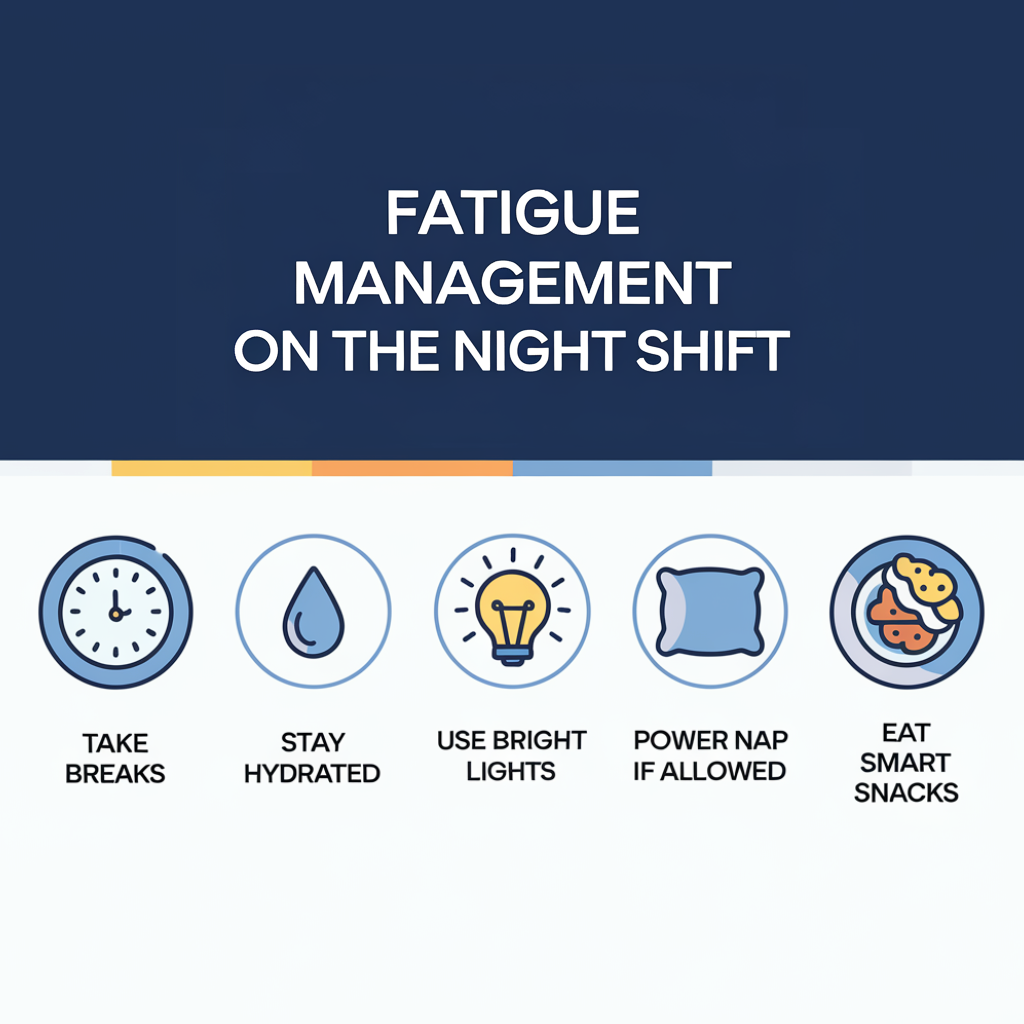
You can cite general findings, too. For instance, injury rates are significantly higher at night than during day shifts – a 30% higher risk (osha.gov). That’s a strong argument for why management should invest in mitigating fatigue.
Perhaps propose a formal fatigue management program or risk assessment on night shift duties. Some companies have started implementing policies specifically to minimize fatigue, like limiting overnight overtime or scheduling a relief worker to step in if someone is too tired. These might be things you can negotiate or at least spark a conversation about.
Improve Security Measures:
Another angle is physical security. Is your workplace and its surroundings safe at night? If you feel uneasy walking out to a dark parking lot at 7 AM, or if the building is half-empty and unlocked at night, suggest improvements. Options include:
Better lighting and surveillance:
- Ask for well-lit parking areas, entryways, and corridors. Security cameras or even a security guard presence during night hours can deter problems.
Badge access or check-ins:
- If people can come and go at night, maybe propose a badge system or regular security patrols so that you’re not alone with unknown visitors.
Escort or buddy system:
- In some companies, security or managers offer to walk night staff to their cars or public transit stops after shift. If you’d appreciate that, mention it – sometimes simple logistical changes can be made if the concern is known.
Emergency protocols:
- Make sure there are clear protocols for emergencies at night. If, say, a medical issue or fire happens, do night workers have the same support (like on-site first aid kits, contacts, alarm systems) as daytime?
- If not, that’s worth negotiating. You might request periodic safety drills or at least an orientation for night staff on emergency procedures specific to your shift.
When discussing safety, it often helps to frame requests as protecting everyone and the company’s liabilities. Employers don’t want accidents or crimes on their watch.
For example: “I think we should look at adding a short handover overlap between the evening and night shifts, so we have a bit more staffing during the most hectic period and no one is working alone. It would make operations safer and smoother.”
Or, “Would the company consider providing taxi/rideshare vouchers for staff who finish work after midnight? It would ensure we all get home safe, especially those who rely on public transport.”
These suggestions show you’re thinking about solutions for better night shift working conditions, not just pointing out problems.
If you have a health and safety committee or a union safety representative, get them involved. Often, there are formal channels for raising safety issues. Document incidents or near-misses and submit them if needed. Having multiple voices (you and your colleagues) emphasize safety can prompt faster action. Remember, nothing is more important than everyone getting through the night shift unharmed.
It’s a shared goal you have with your employer, so use that common ground to push for the changes you need.
5. Career Growth and Inclusion: Don’t Get Left in the Dark
A subtle but real downside of night shifts is feeling “invisible.” Important meetings, training sessions, and networking often happen during daytime. If you’re snoozing (or just off-duty) when those opportunities occur, you might miss out on advancement simply due to timing.
However, being on the night shift doesn’t mean you should be an afterthought when it comes to promotions or professional development. Here’s how to ensure you’re included and progressing:
Ask for Equal Access to Training:
If your company offers training programs, classes, or tuition reimbursement, confirm that you can take advantage of them. Sometimes, mandatory trainings are scheduled at noon, which is a terrible time if you sleep during the day. Don’t be shy about pointing this out and requesting accommodations.
For example, “I’d love to attend the new software workshop, but it’s during my normal sleep hours. Is there a way for night shift staff to get this training – maybe a recorded session or an alternate schedule that week?” Many employers will make an effort once they realize the oversight.
Ensuring night shift workers have access to the same resources as day workers (like training and HR services) is actually a recommended best practice for companies.
You can reference that idea, noting that it benefits the company to have all employees skilled and informed.
Communicate Your Career Goals:
Don’t assume your boss knows you’re interested in moving up or into a different role eventually. Schedule a one-on-one to talk about your career path. You could say, “Even though I work at night, I’m very interested in taking on more responsibility and growing with the company. I’d appreciate any feedback or opportunities to do that.”
This opens the door to discussion about how you can gain experience.
Maybe you can occasionally attend a daytime team meeting (with notice so you can adjust your rest), or you could volunteer for a special project that bridges day and night operations. Showing initiative fuels career growth.

Seek a Mentor or Buddy on Day Shift:
Sometimes the information flow skips over night staff. You might miss announcements or the informal coaching that happens when managers see people in person daily. Consider asking a friendly supervisor or a senior colleague who works days if they’d be willing to loop you in or even informally mentor you.
Even just having someone who forwards you the meeting notes or briefs you on water-cooler news can help you stay connected.
This also shows others that you’re proactive about staying in the loop.
Push for Recognition:
It’s demotivating to work hard at night and feel like nobody notices. If you sense that day shift employees get more kudos or awards, bring this up tactfully. Companies might not do it intentionally – they just forget because they don’t see you.
You could mention in a staff survey or a direct conversation, “Our night team has been killing it hitting these deadlines. It would be great if we could be included in the next all-hands meeting shout-outs.” Some companies may start to celebrate your night shift contributions with awards and public acknowledgments, and include night teams in company-wide events.
That’s something you can advocate for. Perhaps suggest a joint day-and-night gathering occasionally (even if it’s just a virtual town hall at a time amenable to both) or ask that leadership visits during night hours once in a while to say hello and thank you. Inclusion boosts morale.
Equal Benefits and Policies:
Ensure that you’re getting equal treatment in terms of promotions and perks. For instance, if promotions are decided, are you given a fair shot to apply/interview even if the boss never sees you? If not, ask HR how you can make sure your interest is known.
Also, little things like holiday party invitations or sports leagues – it’s nice to be invited even if you usually can’t attend. You could suggest they rotate the timing of some optional events or create an occasional social event geared toward night staff. It may seem small, but feeling part of the company culture is important.
In all these conversations, the key is to remind the employer that night workers are an integral part of the team and deserve the same growth opportunities as anyone else.
You might frame it like, “I know we operate mostly behind the scenes at night, but we have skills and ambitions just like the day shift. I want to continue developing professionally. What steps can I take to do that on this shift?” This puts some onus on management to support you.
If you’re in a union, you can also raise these issues with your union leadership. Unions often fight for things like fair promotion processes and training access. They might negotiate clauses about job postings being available to all employees or extra pay for training outside normal hours. Use those channels if they exist.
6. Leverage Support and Negotiate Strategically
You’ve identified what to change and gathered your points – now it’s about how you best negotiate. Going it alone can be intimidating, but remember you don’t necessarily have to. Here are some final tips to bolster your effort and ensure a professional negotiation:
Strength in Numbers:
- Talk to your night shift peers about the issues and potential solutions you plan to bring up. Chances are they feel the same way. Approaching management as a unified group (or at least mentioning, “Several of us on the shift have noticed…”) may carry more weight than a lone voice. Just be careful to keep the tone collaborative, not adversarial. You want to show that the team cares about improving conditions together.
Use Union and Employee Groups:
- If a union represents you, absolutely loop them in. They can advise you on the best approach and may even handle negotiations for certain issues. For example, pay differentials or scheduling rules might be handled in the collective bargaining agreement.
- Even if you’re not unionized, maybe there’s an employee resource group or committee for shift workers or workplace wellness. These groups can amplify your concerns to upper management. Don’t hesitate to use the structures available to you – that’s what they’re there for.
Choose the Right Time and Person:
- Timing can make a big difference. Request a meeting at a calm time of the workweek, not during a crisis or the busiest moment. Ideally, talk to your direct supervisor first (since blindsiding their boss might ruffle feathers).
- If your supervisor isn’t responsive, you can respectfully escalate to HR or higher management, but give your boss a chance to address things. They might actually appreciate you bringing solutions, since it shows initiative.
Stay Professional and Positive:
- It’s important to keep the conversation professional. Come in with a problem-solving mindset rather than just a list of complaints. Use “I” statements and focus on outcomes: “I feel that with a more predictable schedule, I can be more effective” rather than “Your scheduling is ruining my life.”
- Emphasize you enjoy your job (if true) and want to make it more sustainable. Thank them for taking the time to listen. These little gestures set a cooperative tone.
Be Prepared for Pushback:
- Your manager might have concerns – maybe budget limits, or “this is how we’ve always done it.” Think in advance about how to address those. If they say, “We can’t afford a pay raise for night shift,” perhaps suggest non-monetary perks (extra day off, etc.) as a compromise.
- If they worry about fairness with day shift, you could propose a trial period for a new policy just for nights, or explain why nights truly are a special case (back it with those facts you gathered). Show that you’re flexible and willing to find a middle ground.
Get Agreements in Writing:
- If you do reach an agreement on something, politely ask for confirmation in writing. An email recap to your boss saying “Thanks for agreeing to XYZ starting next month” will avoid any “misunderstandings” later. It doesn’t have to be formal, just clear. This also signals that you take the outcome seriously.
Follow Up:
- If you don’t see any action after a reasonable time, follow up. Sometimes things move slowly, or managers have to get approval. It’s okay to check in: “Just wanted to follow up on our discussion last month about adding a shift differential – has there been any progress or anything else you need from me?”
- This keeps it on their radar. If you get a hard no, ask politely what the reasons are – it might open a further dialogue or at least give you insight. You can always revisit the topic a few months later, especially if circumstances change (like if a bunch of night staff quit – that might make the case more urgent).
Finally, keep in mind that negotiating better night shift working conditions is often a gradual process. You might not get everything you ask for immediately. But even small wins – a slight schedule tweak, one additional wellness resource, a promise to re-evaluate pay next quarter – can improve your quality of life on the night shift.
Your well-being and job satisfaction are worth advocating for. By approaching the conversation thoughtfully and backing it with facts and support, you increase your chances of success.

Conclusion: Take the First Step Toward Better Night Shift Working Conditions
Working nights doesn’t mean you should settle for less in your work conditions. From scheduling and health support to fair pay and career opportunities, there are many aspects you have the right to discuss and improve. Approach negotiating better night shift working conditions professionally, armed with information, and with a cooperative attitude.
Remember, management isn’t telepathic – they might not realize there’s a problem until you voice it. By speaking up, you’re not just helping yourself but also paving the way for all night shift employees to have a safer, healthier, and more rewarding work experience.
As one safety publication put it, ensuring support for night workers isn’t just a nicety, it’s an investment in the workforce’s health and productivity (corporatewellnessmagazine.com).
So, consider what change would most impact your nightly grind, and make a plan to advocate for it. Maybe this week you’ll gather some notes and chat with a coworker about teaming up. Maybe next week you’ll send that meeting request to your supervisor. Small, thoughtful steps can lead to big improvements.
By negotiating for better night shift working conditions in a professional way, you’re standing up for yourself in the best possible light. Here’s to better nights ahead!


![Photo of [object Object] in undefined](https://nightowling.com/wp-content/uploads/2025/11/image-28.png)